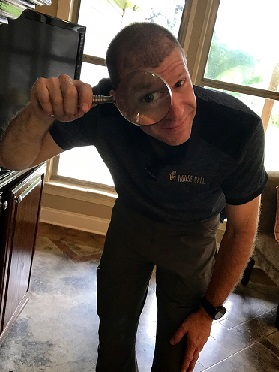This article is the second part of a two-part series. Click here to read part one.
Running a small business can be a wonderful experience, bringing with it a sense of excitement and fulfillment when things go right. At the same time, things don’t always go the way we’ve planned. When things do go wrong, those feelings of happiness can quickly turn to angst and frustration. Being prepared to deal with the potential pitfalls in running a business can make these challenges a bit easier to take.

One of the best ways to prepare ourselves to face these inevitable problems is to learn as much as we can about the enemy. The more we know about the common pitfalls that affect small business owners, the better prepared we will be to deal with them when they do eventually rear their ugly head.
Continuing on with our list from the previous article, we move into the last of the 7 pitfalls of small business.
4) Shiny object syndrome
Running a small business is hard work. We’re often call upon to do many different things, wearing numerous hats in our business and doing the jobs that would be handled by multiple people in a “normal” company. If we let it, the stress of this situation can wear us down, causing us to want to put important tasks, the ones we really despise (like doing our taxes) on the back burner.
We’ll look for any excuse to keep from doing the hard part of our job. We’ll often start doing something that we know is important, excited by the fact that we’re finally tackling a critical task. But all too soon, that initial excitement wears off, and we’re left with the reality of working on something that we really don’t like.
And that’s when it starts.
Very soon our attention starts to wane, and we start looking for something fresh and exciting; we look for that next shiny object. It’s innovative! It’s fresh! It’s amazing and we’re bound to love it, unlike this boring crap we’re doing right now. And so, we jump ship, giving up on the hard task at hand for a new and exciting undertaking.
Until, of course, our shiny new assignment itself starts to get too hard, and we’re again on the hunt for something different, something easier than what we’re doing.
We find ourselves moving from task to task, jumping to the latest shiny object that comes into our field of view, always hoping that the next new thing will be exactly what we’re looking for: maximum results with minimum work. We’re ready for the wins, but don’t really have the commitment it takes to put in the hours to achieve them. We’re right back to that instant gratification thing again.
We’re all old enough to realize that there’s nothing worth having that isn’t precluded by some hard work. It’s true in life and it’s true in business. Unless we buckle down and do the hard part, putting in the work to finish something once we start it, ignoring that next shiny object until we finish working on the last one, we’ll never be able to reach our goals.
It’s easy to keep jumping ship every time something starts to get difficult. It’s what everyone does. But if you stop and think about it, most businesses don’t end up being successful. The ones that do reach that pinnacle are usually the ones that push through the hard part and see things through to the end. Remember what your parents used to tell you, if it was easy, everyone would be doing it.
5) All by myself
As we alluded to above, a small business owner must wear many hats in running their business. From marketing to accounting, personnel decisions to management, customer service, maintenance, procurement, and training, all the way to actually doing the job, it’s all on our shoulders. Because of this fact, that we need to do everything when we’re first starting out, we start believing that have to keep doing everything.
We get used to doing it all and start to believe that we’re the only ones equipped to do the things that need to get done in our business. We start to think there’s no way that someone else will be able to do things the way we want them done. So, even though our business starts to grow, we keep playing in our one-man band.
We keep doing everything ourselves, until we eventually reach a point where we can’t. We simply run out of time in the day. There are just not enough hours available to get done all the things we need to do to keep our business thriving.
It’s important to remember that whenever we say yes to something in our lives we have to say no to something else (in order to make time for that yes.)
So, what do we do? We start stealing hours away from other things in our lives. First to go is usually our sleep. From eight to six to four and a half, we whittle down the time we spend sleeping, trying to keep up with all the tasks it takes to run a business. Next comes our personal time. We give up our hobbies in favor of work. Then comes our family. First, it’s meals together, and soon it progresses to missing out on things that should be more important than work.
And before you know it, life has passed us by.
And all we’ve done is worked.

Growing our business is a goal that every small business owner should strive for, but not to the exclusion of living a full life. It’s up to us to realize that when the time comes, we’ve got to be strong enough to ask for some help.
It takes strong character to be able to do all those different tasks while you’re growing our small business, but it takes a strong leader to know when it’s time to hand off some of the minor jobs to someone else.
You may believe that the bookkeeping methods you’ve cobbled together over the years are exactly what you need. And you’re probably right; there’s no one else that will be able to do it exactly like you want it done. But does it really matter that much that the spreadsheet looks precisely like yours, or is the important fact that it gets done and is done correctly?
Is doing data entry really the best use of our limited time, or would our business be better served by us doing a bit more marketing and gaining a few more clients?
It can be difficult for us to let go of some parts of our business. After all, we’re the one’s who’ve built it up this far. But, unless we figure out how to clone ourselves or add 10 more hours to the clock each day, there comes a time when we’ve got to make some difficult decisions. We need to figure out what duties demand our attention, and which ones could be done by someone else.
There’s only one of us, and our time becomes increasingly valuable as our business grows. Figure out the tasks that only you can do and hand off the others to someone who can be trusted to get the rest done. Yes, it may stress you out while you’re trying to find the right people, and it may take a bit of work to get them on the same page as you, but I guarantee there’s someone out there who’s better than you at Quickbooks, Instagram marketing and scheduling appointments.
It just takes courage and commitment to decide that you’re enough of a leader to hire them.
Do what you do best and outsource the rest,
Peter Drucker
6) Why can’t I be you
Unless you’ve been lucky enough to create a brand-new industry from thin air, we’ve all got competition. And unless you’ve been blessed with the most self-control ever possessed by a mere mortal, we’re all going to sneak a peak to see how our competitors are doing in our market.
It’s human nature to want to compare ourselves to our competition. To see how we’re doing in relation to other people. Am I number one? How far back am I? Am I gaining ground? We all want to know how we’re doing.
And while it’s normal to want to know where we stand in our business, we must guard against letting that comparison rule our thoughts. We can’t spend every waking moment comparing our business to our rival’s. It’s not healthy and it’s not productive.
If we really stop and think about it, checking out what our competition is doing can be a double-edged sword. On one hand, it’s good to keep an eye on your competitors. Seeing what other businesses are doing in our space can serve to motivate us, increasing our desire to reach similar heights. If a competitor has just hired some new inspectors, that lets you know that your market is big enough to sustain growth, and should motivate you to do something new to attempt to capture some of that growing market for yourself. If you see a competitor moving in a new direction with their software or their business offerings, that can serve as the impetus for you to start investigating new things for your business. Monitor what’s working for them and start probing your market for information related to new ideas and products. They say imitation is the sincerest form of flattery.
Yet, instead of using our competition to motivate us, we often fall into the trap of comparing our success to theirs. We forget that we’re different people, on different paths at different times and simply wonder why we’re not doing as well as they are. Everyone is different; everyone’s story is different, and everyone’s circumstances are different. It’s not fair to us (and it’s not fair to our competitors) to try and compare ourselves to them. They’re not us and we’re not them. And even if your main competitor happens to be your twin brother, there are still things that are different between the two of you and your situations.
It’s OK to try to learn from your competitor’s achievements and failures, just try not to become so obsessed with them that you become a carbon copy of their company. There’s only one original, so why try to be a knock-off? Why not be your own original?
There is a business owner that you should be comparing yourself to on a regular basis: the previous version of you. How did you do things last year, and what are you doing now that’s better? How would you’ve handled this situation last month, and what can you do to handle it better this time? What was our marketing strategy last fiscal quarter, and what are we doing this quarter to double our last results?
By focusing most of our attention on getting better than the version of ourselves that got us here, we can concentrate on beating the only competitor that really matters: the past version of ourselves.
7) Time is not on my side
This last problem encompasses a little bit of each of the previously discussed challenges and rolls them all up into one neat little package. It’s one of the main struggles that faces any entrepreneur: how to balance our work life and the rest of our life.
If you stop to think about it, there are many different things that we value in our lives: money, friends, possessions, etc. But each of these things are transient, meaning they often come, and they go. If we lose all our money, we can always figure out a way to make more. If our friends abandon us, it’s quite likely that we can make new friends. If a tornado touches down and takes all of our possessions, house, boat and car, we can find a way to replace what was lost. Most things in our lives can be replaced. We can always work harder to restore what we’ve lost.
But the one thing we’ve yet to figure out how to make more of is time. We all have a set amount of time on this earth, and that’s all we’re allotted. We don’t know how much we have, and we don’t know when it’s going to end. Time is our most valuable possession, and yet it’s often the one thing we think about the least when we’re planning out our lives.
Running a small business is hard. There’s always something else to be done. Someone else to call. Emails to return. Marketing programs to design. Clients to reach out to and vendors to thank. New ideas to work on and new opportunities to investigate. The list of things to do keeps growing, and you never seem to reach the end.
Work expands so as to fill the time available for its completion.
Parkinson’s Law; C. Northcote Parkinson
It’s certainly an admirable trait to want to work hard, and such work is often necessary in order to build a flourishing business. However, without proper boundaries you’ll often find that your business fills up all the available time in your life.
While we earlier derided having to punch the clock when we went to work, there was one good thing about the time clock: it let us know exactly when we could stop working. When you own your own business, there is no time clock to punch. And with our modern, digital “conveniences,” we can work from anywhere, at any time.
Sitting on the beach on family vacation? Got time to check my email.
Lying in bed with your spouse? Now’s my chance to respond to that message about scheduling an inspection.
Sitting in church, waiting for services to start? I can quickly pop over to Facebook to see if I need to adjust my latest campaign.
At the dinner table with your daughter asking you a question? In a minute honey, let me just finish this inspection report and get it sent.
It’s a great thing that your so committed to your business that you want to do everything in your power to make it a success. But what good will it do you to make your business a winner if you lose everything else in your life that matters?
Set some boundaries for yourself, so that you don’t end up working yourself into a cold and solitary existence. Use that phone to set an alarm that tells you when you’re off the clock. That email, that text, that IM can wait. It will still be there tomorrow. And if that client is so high strung that they get pissed that you didn’t duck out of your uncle’s funeral to answer them immediately, is that really someone you want as a client, anyway?

Running our own small business can be a wonderful way to make a living. By doing it properly, we can often become successful, help other people and create a legacy to pass along to our family and/or trusted employees. But if we fall into the trap of letting our business run us instead of us running it, we can lose everything else along the way.
Stay smart. Stay strong. Stay vigilant.
This post is based on a presentation by Pat Flynn on the Smart Passive Income podcast. Check out Pat’s work at https://www.smartpassiveincome.com
I welcome all feedback (both positive and negative) on this post.
Please take a moment to leave a comment below. Thank you!
Want to be an Influencer in Your Field? Share This Post!
Thanks, Joe

